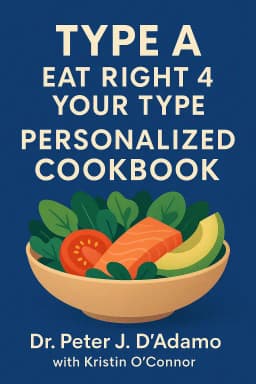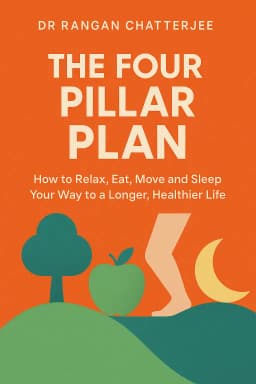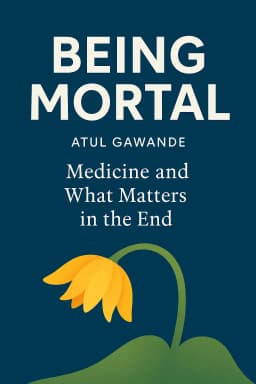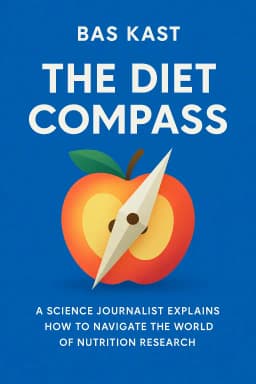
Personalized Podcast
Golden Hook & Introduction
SECTION
Orion: We meticulously track our financial portfolios, right? We check our stocks, we analyze our retirement accounts, we hunt down hidden fees. But what about our nutritional portfolios? What if the food we eat is the most important investment we’ll ever manage?
aleck: That’s a powerful question, Orion. It immediately makes me think about how much energy I put into understanding my financial health, but how often I just… trust the packaging when it comes to my physical health. There's a huge disconnect there.
Orion: Exactly. And that disconnect is where our conversation starts today. We're diving into a book by Stefanie Sacks called "What the Fork Are You Eating?: An Action Plan for Outsmarting the Food Industry." Think of it as the ultimate prospectus for your body's ROI. It’s about learning to read the fine print on a system that is, frankly, often designed to mislead us.
aleck: I’m already hooked. Outsmarting a system is a theme I find deeply compelling, whether it’s in finance or, as it seems, in the grocery aisle.
Orion: Perfect. Today we'll dive deep into this from two powerful perspectives. First, we'll conduct a 'nutritional due diligence,' uncovering the toxic assets hidden in our food. Then, we'll discuss the concept of 'the activist's fork,' exploring how our choices can become a tool for change.
Deep Dive into Core Topic 1: Nutritional Due Diligence
SECTION
Orion: So let's start with that due diligence. The book introduces this brilliant, if slightly terrifying, concept of "Top-Rated Terminators." These are the worst offenders in our food supply: chemical preservatives, artificial sweeteners, trans fats, and so on. The book frames them as things to be systematically eliminated.
aleck: "Terminators." That's a strong word. In finance, we'd call those "toxic assets." They're the investments that look appealing on the surface, maybe they offer short-term convenience, but in the long run, they're guaranteed to drag your entire portfolio down.
Orion: That is the perfect analogy. And the food industry is incredibly skilled at marketing these toxic assets. The book is full of examples, but one story really stands out. It’s about a health-conscious mother named Sarah, living in suburban Chicago back in 2018. She was trying to do everything right for her family.
aleck: I can already feel the setup. She’s the diligent investor.
Orion: Precisely. She’s in the snack aisle, looking for something healthy for her kids. She finds a snack bar with packaging that screams "healthy." It has big, friendly letters saying "All Natural" and "Low in Sugar." So, she trusts the label. She buys them, feeling like she’s made a good, responsible choice for her family.
aleck: Of course. That's the marketing headline, the promise of a great return. You see "natural" and you think, "This is a blue-chip stock."
Orion: Exactly. But later, something makes her curious. She starts doing a little research into the actual ingredient list on the back, the part in the tiny font. And what she discovers is that the bar is loaded with artificial sweeteners and chemical preservatives. The "natural ingredients" the front of the box bragged about were present in minuscule amounts. The bulk of the bar was highly processed, artificial junk.
aleck: Wow. That feeling of betrayal is so familiar. It's the nutritional equivalent of discovering your "low-fee" retirement fund is packed with hidden 12b-1 fees and a high expense ratio. The prospectus cover promises one thing, but the reality, buried on page 47, is designed to profit from your inattention. The system is built on that information asymmetry.
Orion: Information asymmetry. That's it. Sarah felt completely deceived. And that single moment changed everything for her. She realized that "due diligence" wasn't optional. It was essential for her family's health. She had to learn to read the fine print.
aleck: It really highlights the hidden cost of convenience, doesn't it? We're so busy, we outsource our trust to a brand or a flashy label. But that trust has a price, and it’s paid by our bodies. So, based on the book, what's the most common "hidden fee" we should be looking out for?
Orion: Sacks points to many, but artificial sweeteners are a huge one, precisely because they are marketed as a health benefit. The book details how things like aspartame and sucralose, while having zero calories, can potentially disrupt our gut microbiome and even, paradoxically, increase our appetite for sweet things.
aleck: So it's a "no-calorie" loan that you pay back with interest in the form of future cravings and potential health issues. The accounting never really balances, does it?
Orion: It never does. And once you start seeing those hidden costs, those toxic assets, you can't unsee them. Which, you know, can feel overwhelming at first. But it's also the first step toward taking back control.
Deep Dive into Core Topic 2: The Activist's Fork
SECTION
Orion: And that naturally leads us to our second idea, which is about what you do with that newfound knowledge. It’s not just about defense; it's about offense. One of the endorsers for the book, Mary Beth Augustine, asks this incredible question: "Is your fork a weapon of mass destruction, or does it wield food as medicine?"
aleck: Hmm. I like that. It reframes the entire act of eating. It’s not just consumption; it’s a choice with consequences beyond yourself. It's an action.
Orion: It's a powerful action. The book argues that every dollar you spend at the grocery store is a vote. You're either voting for the industrial food system, with its terminators and misleading labels, or you're voting for a different system—one that's more transparent, more local, more focused on actual nourishment.
aleck: That is incredibly powerful. It reframes a mundane, everyday act into something with real moral weight. You know, it reminds me of the figures I admire, like Rosa Parks. Her defiance wasn't just a personal act of being tired. It was a strategic, political statement. But the movement's success, the Montgomery bus boycott, wasn't just about her. It was about thousands of other people making a conscious, difficult choice every single day—to walk, to carpool, to sacrifice their convenience—and that collective economic pressure is what ultimately forced the system to change.
Orion: That's a fantastic connection. The boycott was a perfect example of collective economic action. And Sacks is arguing we can do the same thing with our food choices.
aleck: It feels like a small echo of that same principle. Choosing the organic produce, or buying from the local farmer's market, even when it's a little more expensive or less convenient, isn't just a self-interested health choice. It's a vote. It's sending a signal, a tiny bit of economic pressure, that says, "I want something different. I demand a better system." It’s a quiet form of activism.
Orion: A quiet form of activism, I love that. And it counters the feeling of helplessness. You read about "Big Food" and the government, and it feels like this monolithic, unchangeable thing. But the book’s message is that the most powerful weapon we have is already in our hands, three times a day.
aleck: Right. And it connects back to the idea of continuous learning and self-improvement that I find so important. Improving your professional skills, your financial literacy, your nutrition—they aren't separate pursuits. They're all part of a larger project of becoming a more conscious, effective, and empowered person. It’s about refusing to be a passive participant in the systems that shape our lives.
Orion: You just perfectly captured the spirit of the book. It's not just a diet plan. It's a manifesto for becoming a proactive agent in your own life.
Synthesis & Takeaways
SECTION
Orion: So, to bring it all together, we've really looked at this through two lenses that you, aleck, brought so clearly into focus. First, we have to become financial auditors for our own bodies, doing the due diligence to uncover the toxic assets in our food.
aleck: And second, we have to see ourselves as activists, wielding our forks and our wallets to vote for the kind of food system we actually want to live in.
Orion: Exactly. It's a powerful one-two punch of awareness and action. So, for someone listening who feels both inspired and maybe a little daunted by all this, what’s a good first step? What's the one actionable takeaway?
aleck: I think it’s about shifting from being a passive consumer to a proactive investor in your own health. The same way you might review your financial statements quarterly, the first step is to conduct a "Pantry Audit." And don't try to fix everything at once. That's a recipe for failure.
Orion: A simple audit. I like that.
aleck: Yes. Just pick one category. Open your pantry or your fridge and be honest. Identify one "toxic asset" that you know isn't serving you. Maybe it's the diet soda with its artificial sweeteners, or the sugary cereal, or the processed snack bars. Just one. And your first action is simply to divest. Don't buy it again. Find a better alternative. That small, conscious choice is the first deposit in your new, high-return health portfolio.
Orion: Divest from one toxic asset. That is a perfect, manageable, and powerful first move. aleck, thank you. You’ve given us a brilliant framework for thinking about this.
aleck: It was my pleasure. It’s clear that being smart with your money and being smart with your food are just two sides of the same coin.









